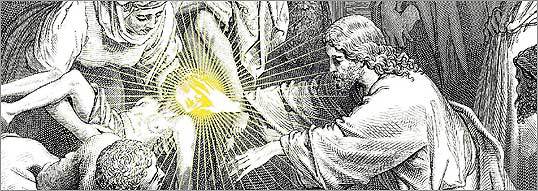
To quote the sportscaster Al Michaels at the end of the U.S. hockey team's victory during the 1980 Olympics: "Do you believe in miracles?" (You have to shout this if you want to quote him accurately.)
I do, but there are many believers who don't. And it's not hard to see why. To my mind--and I'm being serious here--I figure that if God can create the heavens and the earth, raise his son from the dead, and so on (to say nothing of what his son's miracles during his earthly ministry) then something like healing someone from an incurable disease in the modern world is, by comparison, relatively easy. Plus, I've read plenty of medical reports surrounding the many verified miracles at Lourdes. And I've also seen and heard about what I would call "minor" miracles in people's lives that remain inexplicable.
But belief in miracles raises a very difficult question for those who believe in them (including me): Why is one person "cured" while another remains ill? This is where those who do not believe in miracles have a very strong case: for if you admit of the possibility of miracles, then you have to grapple with the question of whether this means that God plays favorites. And many of my friends simply cannot abide that image of God.
However, it seems to me that miracles do occur these days, hard as it for many of us--including me--to comprehend them. To that end, an article on "Modern Miracles" by Michael Paulson of The Boston Globe.
James Martin, SJ








That said, I don't know that saving the life of one person by miracle and not that of another indicates favoritism or bias on the part of God. There is a modern notion that we are all the same and we are all equal; I think it is this idea that leads to the misconception about ''favoritism.'' We are all equal in the sence that we are equally loved by God but this doesn't mean that we are all meant to rise to the same heights or are meant to suffer the same challenges. With faith in God should come a faith in God's plan. On one hand, that person who is saved may live to do great things or they may only make a difference in one person's life. That is God's plan. On the other hand, the person who is not saved by miracle is not a victim of God but is one who is being welcomed into eternal salvation with God which, truly, is a gift.
Thank you for posting this blog entry. I enjoyed reading it.
-Tom
In Jesus' day, miracle working seemed much more accepted. While miracles still occur, most people rely on science for some things, while they are forced to rely on miracles for others , like treatment for alcohol and drug addiction, where a more spiritual approach is required for recovery.
Just a few short months ago, the Catholic press was full of debate over Reiki, which uses "energy" and touch to heal. Having been the beneficiary of it, I know it works. I would likely benefit from it now for a malady I am currently dealing with - however I will likely instead rely on the surgical arts to eventually rip out the offending organ that in the past had benefited from Reiki.
The real miracle we all have to face is eternity. Left to our own logic, we can conceive of either annihilation or the equally daunting pressence of the eternal God in a never ending moment (which might as well be annihilation, since the self would seem not to be able to survive such an encounter). No one has been to that place after death and returned - and even if they did, the organ by which we would remember the experience was safely dead back in the corpus. The miracle we have is the experience of the Risen Lord and the faith that he will not simply plop us down in front of God in a place outside of time.